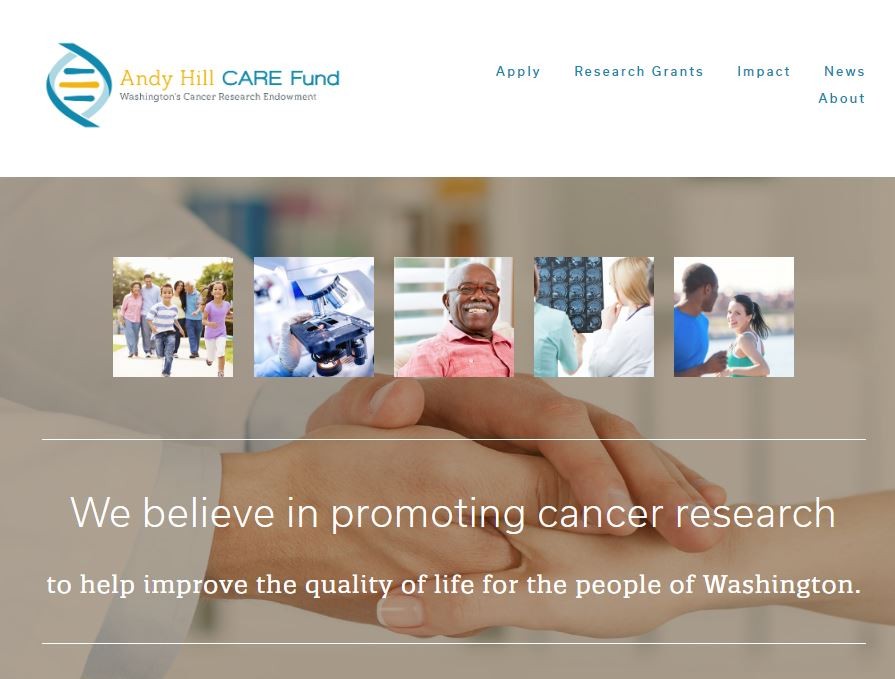CARE Announces Grant Awards to Accelerate Breakthroughs in Cancer Research
Thursday, December 20, 2018

SPOKANE – The Andy Hill Cancer Research Endowment (CARE), a public-private partnership that supports cancer research in Washington, today announced grant awards totaling $1.15 million to leading research scientists advancing cancer research in the state.
The CARE Breakthrough Research program funds innovative, cross-disciplinary research and multi-institution collaborations that aim to find the next big discovery in cancer research. Grants were awarded to two CARE Breakthrough Grant cancer research projects:
$750,000 was awarded to the Institute for Systems Biology to support Dr. James Heath’s work on proactive cancer immunotherapies for initial and recurrent disease.
$400,000 was awarded to the University of Washington to support Dr. Andre Lieber’s work to improve outcomes for women with recurrent ovarian cancer by improving the efficacy of a particular chemotherapy drug.
The $1.15 million in total Breakthrough Research Grant awards for the first year of the multi-year grant of public funds will be matched by more than $3.6 million in non-state funds committed by the grant recipients.
“It is appropriate that this fund honors the life and legacy of Senator Andy Hill. This funding helps bolster a long history of cancer research that has produced revolutionary discoveries for improving the lives of countless people today and for many generations to come,” said Governor Jay Inslee. “Washington’s life science cluster is one of the most innovative and influential in the country, and in the world.”
“The CARE Fund is pleased to support this innovative research,” said Laura Flores Cantrell, Executive Director for CARE. “Each research project builds additional investment in cancer research, carrying the promise of real progress toward improving health."
Applications for the Breakthrough Research Grants were independently reviewed by the American Association for the Advancement of Science (AAAS) and those researchers recommended for funding were approved by the CARE Board.
Based on the objectives of the CARE Fund, applications were reviewed and evaluated on their ability to:
-
Optimize the use of public funds by giving priority to research utilizing the best science and technology with the greatest potential to improve health outcomes;
-
Increase the value of our public investments by leveraging our state's existing cancer research facilities and talent, as well as clinical and therapeutic resources;
-
Incentivize additional investment by requiring private or other non-state resources to match public funds;
-
Create jobs and encourage investments that will generate new tax revenues in our state; and
-
Advance the biotech, medical device, and health care information technology industries in Washington.
About the Andy Hill CARE Fund
Washington State is home to world-class cancer research and care centers. With the establishment and funding of the Andy Hill Cancer Research Endowment (CARE) Fund, Washington State affirmed its commitment to saving lives, relieving pain and suffering, and reducing long-term health costs through sustained investment in cancer research.
Created by the Legislature in 2015, the law (Chapter 43.348 RCW) enables the State to provide up to $10 million annually for 10 years to exclusively fund cancer research in Washington State. The fund is built on a public-private partnership model and incentivizes additional investment by requiring private or other non-state resources to match state funding.
Empire Health Foundation (EHF) in Spokane serves as the CARE Fund’s Program Administrator, responsible for administering grants and working with expert scientific review panels to provide independent evaluation of grant applications. EHF is a private health foundation with philanthropic assets totaling approximately $76 million. Through partnerships with key community leaders, government agencies and nonprofit organizations, EHF seeks to move the dial equitably, measurably and sustainably on health by investing in improvements in health outcomes, strengthening health systems, growing physician supply, building nonprofit capacity and advancing health equity.
###